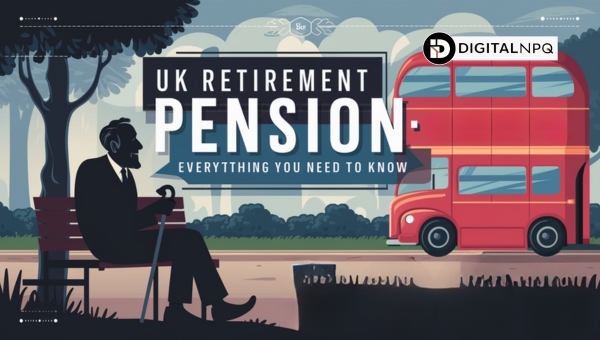UK Retirement Pension: Everything You Need to Know

The UK retirement pension can feel overwhelming, but we’ve got you covered. In this article, we’ll delve into everything from eligibility criteria to how much you can receive and how to claim your pension. We’ll also explore working beyond the state pension age and special considerations if you live or work abroad.
By the end, you’ll have a comprehensive understanding of the UK retirement pension, empowering you to make informed decisions about your financial future. So, let’s dive in and unlock the crucial details you need to know!
Decoding the UK Retirement Pension System
The UK retirement pension, also known as the state pension, offers essential financial support for individuals as they transition into retirement.
This government-provided payment becomes available once you reach the state pension age. The amount you receive primarily depends on your National Insurance (NI) contributions over your working life.

To qualify for the full new state pension, you need 35 qualifying years of NI contributions. If you have at least 10 qualifying years, you may still receive a partial pension. This system ensures a basic level of income for retirees, helping to cover living expenses and maintain financial stability during retirement.
Eligibility Criteria
To qualify for the UK retirement pension, meeting specific requirements is essential:

- National Insurance Contributions: You need to have at least 10 qualifying years of National Insurance (NI) contributions to be eligible for a partial pension. For the full new state pension, 35 qualifying years are required.
- Qualifying Years: These can be earned through paid NI contributions, NI credits (for periods like unemployment or caring), or voluntary contributions.
- Spouse or Civil Partner’s Record: Your pension might be influenced by your spouse’s or civil partner’s NI record. In some cases, you could inherit part of their pension upon their death.
It’s important to note that these criteria determine the amount and eligibility of your pension benefits. Ensure you keep track of your NI contributions for optimal retirement planning.
Pension Amount and Payments
Understanding how your UK retirement pension works is crucial for effective financial planning. Let’s delve into the specifics of what determines the amount you can receive, how it increases annually, and the methods for getting your payments.

How Much You Can Get?
The amount of your UK retirement pension is primarily determined by your National Insurance (NI) contributions. To receive the full new state pension, you need to have 35 qualifying years of NI contributions. If you have fewer qualifying years, the amount will be proportionately less.
For instance:
- 35 Qualifying Years: Full new state pension, currently £221.20 per week.
- Less than 35 but more than 10 Qualifying Years: Pro-rata amount based on the number of years.
- Less than 10 Qualifying Years: Generally, no state pension is received, though some exceptions may apply.
Your pension amount may also be influenced by additional voluntary contributions or credits received for certain life situations, such as caring responsibilities or periods of unemployment.
Annual Increases
State pensions in the UK typically increase each year to keep up with the cost of living. This adjustment is governed by a system known as the “triple lock.” The triple lock ensures that the state pension rises each year by the highest of the following three measures:
- Inflation: Measured by the Consumer Price Index (CPI).
- Average Earnings Growth: Percentage increase in average wages.
- 2.5%: A guaranteed minimum increase.
This mechanism helps to protect the purchasing power of retirees, ensuring that their pension income keeps pace with rising costs.
How It’s Paid?
Receiving your pension is straightforward, with payments made directly into your bank account. Here are the key points to note:
- Frequency: Payments are usually made every four weeks.
- Bank Account: You must provide up-to-date banking details to the Pension Service.
- International Payments: If you live abroad, your pension can still be paid into a foreign bank account, though currency conversion fees may apply.
Ensure that your banking information is current and accurate to avoid any disruptions in receiving your pension benefits.
Claiming Your Pension
Navigating the process of claiming your UK retirement pension involves several steps and considerations. Whether you decide to claim immediately or delay your pension, understanding the procedures can ensure you make the most informed decisions. Let’s break down the essential steps and options available.
How to Claim?
To claim your state pension, follow these steps:
- Receive Notification: About two to four months before reaching state pension age, you will receive a letter from the Pension Service outlining the claiming process.
- Gather Information: Ensure you have your National Insurance (NI) number and proof of your date of birth ready.
- Submit Your Claim: You can claim your pension online, over the phone, or by post. Each method will require your identification details.
Delaying (Deferring) Your State Pension
If you choose to delay your state pension, there are several benefits and considerations:
- Higher Weekly Amount: Deferring can increase your pension amount. For example, deferring for a full year can result in a 10.4% increase in your weekly payment.
- No Action Required: If you do not claim your pension when you reach state pension age, it will automatically be deferred.
Claiming Online, Over the Phone, or By Post
You have multiple methods for claiming your pension:
- Online: Visit the official UK government pension website and complete the online application form.
- Over the Phone: Call the Pension Service and provide your NI number and identification details.
- By Post: Fill out the claim form included in your notification letter and mail it to the address provided.
By understanding these processes, you can ensure a smooth transition into your retirement years.
Also Read: Social Security and Medicare Tax: You Need to Know
Working After State Pension Age
Reaching the state pension age doesn’t mean you have to stop working. Many choose to continue for various reasons, such as financial stability or personal fulfillment. Let’s explore the benefits and considerations of working beyond the state pension age.
Continuing Employment
Continuing employment after reaching the state pension age can offer several advantages:
- Financial Stability: Working can provide additional income, supplementing your state pension.
- Health Benefits: Staying active can improve mental and physical health.
- Skill Utilization: You can continue to use and share your skills and experience.
- Social Interaction: Work can help maintain social connections, reducing isolation.
Additional Benefits
Those who work beyond the state pension age can enjoy extra perks:
- National Insurance Contributions: You no longer need to pay National Insurance, increasing your take-home pay.
- Building Pension: Additional income can be invested into private pensions.
- Tax Benefits: There may be tax incentives for older workers.
- Flexible Working: Many employers offer flexible work arrangements for older employees.
Special Considerations
When it comes to the UK retirement pension, there are several unique factors to consider. These special considerations can significantly impact how you receive your pension benefits and what options are available to you.
If You Live or Work Abroad
Living or working abroad can affect your UK retirement pension. Here are some key points to bear in mind:
- Receiving Payments Abroad: You can still receive your UK state pension if you live abroad, but the amount may vary based on the country.
- Adjustments: Your pension may not increase annually if you live outside certain countries, such as those in the European Economic Area (EEA) or countries with reciprocal agreements.
- Application Process: You might need to apply through the pension authority in your country of residence.
If You Have Gaps in Your NI Record
Gaps in your National Insurance (NI) record can lower your pension amount. Here’s what you need to know:
- Qualifying Years: You need 35 qualifying years for the full state pension. Fewer years mean a reduced amount.
- Voluntary Contributions: To fill gaps, you can make voluntary NI contributions. This is crucial if you’re close to retirement age.
- Deadline: Be aware of deadlines for making these contributions to ensure they count towards your pension.
What Happens When You Die
Understanding what happens to your state pension when you die is essential for planning. Here’s a brief overview:
- Ceasing Payments: Your state pension payments will stop when you die.
- Survivor Benefits: Your spouse or civil partner may inherit part of your pension, which can provide financial support.
- Eligibility: The amount and eligibility for survivor benefits depend on your NI contributions and the specific terms of your pension plan.
These special considerations are vital in making informed decisions about your UK retirement pension. Whether you’re planning to live abroad, have gaps in your NI record, or want to understand what happens to your pension after you pass away, it’s crucial to stay informed and prepared.
Also Read: Maximum Salary for Social Security: What You Need to Know
Further Assistance
Understanding your UK retirement pension can be complex, but you don’t have to navigate it alone. There are numerous tools and resources available to help you manage your pension effectively. Additionally, several organizations provide valuable assistance and support for all your pension-related queries and needs.
Available Tools and Resources
Several tools and resources can help you understand and manage your UK retirement pension:
- Government Websites: The UK government’s official website offers detailed guides and calculators to estimate your pension.
- MoneyHelper: This organization provides free, impartial guidance on pensions and retirement planning.
- Pension Tracing Service: Helps you find lost pensions from previous employment.
- National Insurance Helpline: Offers assistance with your NI record and contributions.
Important Contacts for Help
If you need further assistance, here are some crucial contacts:
- The Pension Service: Call 0800 731 7898 for queries about your state pension.
- MoneyHelper: Visit their website or call 0800 011 3797 for free pension advice.
- Citizens Advice: Provides help on a wide range of issues, including pensions. Visit their local offices or website for more information.
- Pension Wise: Offers free guidance on defined contribution pensions. Call 0800 138 3944 to book an appointment.
FAQs
Can I get my pension if I leave the UK?
Yes, you can still receive your UK state pension if you move abroad. However, the amount you receive may not increase annually in some countries.
Who qualifies for a British pension?
To qualify for the UK state pension, you need at least 10 qualifying years of National Insurance contributions or credits. For a full pension, 35 qualifying years are required.
Can I transfer a UK pension to the US?
Yes, you can transfer your UK pension to a US-based pension scheme. It must be transferred to a Qualifying Recognised Overseas Pension Scheme (QROPS) to avoid tax penalties.
Conclusion
Understanding the UK retirement pension is crucial for planning a financially secure future. From eligibility criteria to the amount you can receive and how to claim it, each aspect plays a vital role in your retirement planning. Whether you’re considering working after reaching the state pension age or need to know how living abroad affects your pension, having comprehensive knowledge can make navigating this process smoother.
It’s important to stay informed and make educated decisions regarding your pension. Explore more insightful articles on our site to continue your journey towards a well-informed retirement plan. Don’t miss out on valuable tips and updates!
